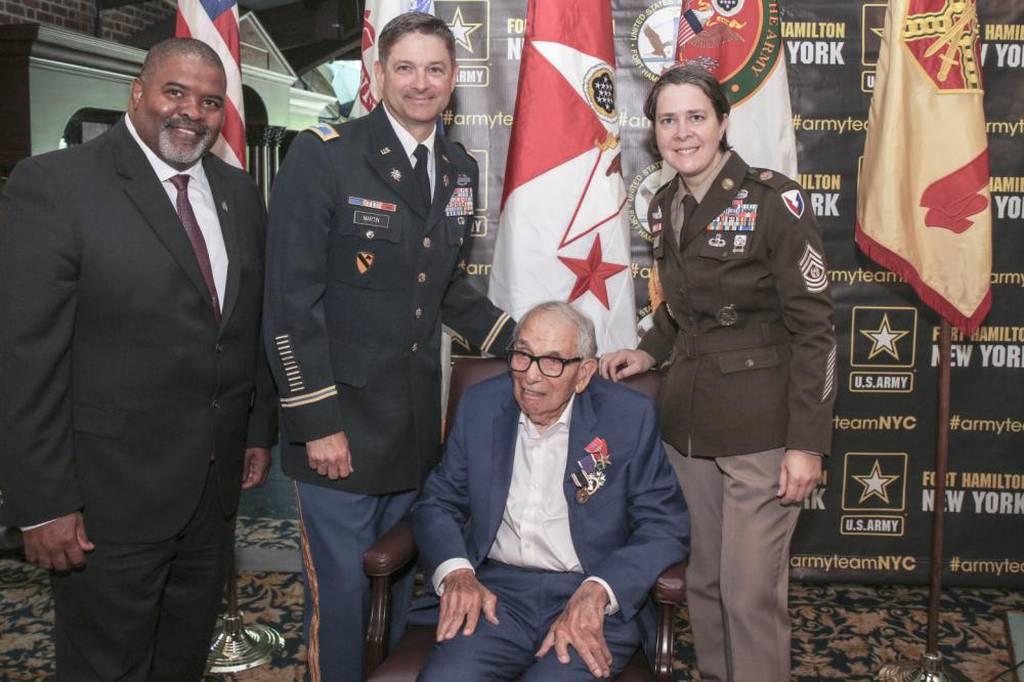

Chief of Staff of the Army Gen. James C. McConville pins the Prisoner of War, Purple Heart and Bronze Star medals on World War II veteran Pfc. William Kellerman during a ceremony at Fort Hamilton, N.Y., June 28, 2022. (Sgt. 1st Class Joseph Moore/Army)

Pfc. William Kellerman was assigned to Company D, 1st Battalion, 315th Infantry Regiment when he landed on Utah Beach in Normandy, France almost 78 years ago on June 11, 1944. He would go on to be captured and held as a German prisoner of war just one month later. (Photo courtesy of William Kellerman)
“It is like I’ve been in the shadows all my life, and someone turned the light on, and they can really see who I am,” Kellerman said at the ceremony, according to a post release. “I cannot thank you enough for being here. God bless America.”
The chief of staff of the Army, Gen. James C. McConville, presided over the ceremony, noting that while the awards were long overdue, they were still worth giving.
“This is 77 years late, but it’s never too late to do the right thing, the right way,” McConville said, according to the Fort Hamilton release. “Today is a great day, because we get to honor a member of our nation’s greatest generation, Mr. William Kellerman.
“It’s my honor and privilege to be here today to help pay Mr. Kellerman a long, overdue tribute for the sacrifices he made in service to the United States of America, to our Allies, and people everywhere.”
Kellerman, born in 1925 and raised in the Bronx, was drafted at just 18 years old. He attended basic training with the then-newly formed 42nd Infantry Division at Camp Gruber, Oklahoma, and was subsequently sent to the 79th Infantry Division, in Kansas.
On June 11, 1944 — just five days after D-Day — Kellerman and his fellow soldiers in Company D, 1st Battalion, 315th Infantry Regiment, landed on Utah Beach in Normandy, France. A month into his tour, the company radio was damaged during a period of heavy gunfire, and Kellerman was sent to notify battalion headquarters. While attempting to do so, Kellerman was captured and taken prisoner by a German tank crew on July 4, 1944.
Held in a building with 80 other POWs, Kellerman was marched nightly by Schutzstaffel guards and fed only one slice of black bread a day, according to the Fort Hamilton release. Despite these conditions, Kellerman managed to escape during the night and travel on almost 600 miles before reaching the Loire Valley, where he luckily happened across the headquarters of the French Forces of the Interior, a resistance group, the release added.
After hours of interrogation, Kellerman was finally able to convince the resistance fighters that he was not a German spy by answering a question only Americans would know — “who won the 1943 World Series?”
“It was an easy question from a boy from the Bronx: it was the New York Yankees,” reads the Fort Hamilton release.
As part of Operation Sherwood, Kellerman and 152 airmen from the Royal Air Force and other allied countries were hidden by resistance fighters in Freteval Forest. The troops remained there until they were liberated by American forces in August 1944, at which point Kellerman returned to active duty with the 79th Infantry Division.
The following April, Kellerman’s unit was engaged in combat with German forces when he was shot in the hand and leg by enemy small arms fire. He was treated at a war hospital in Czechoslovakia until the end of the war and returned home to the U.S. in 1946.
According to the Army press release, Kellerman’s awards were not previously given because of an “administrative oversight at the unit level” in the aftermath of World War II.
His file was also one of millions lost in the 1973 fire at the National Personnel Records Center in St. Louis, Missouri.
But with help from Kellerman and his family, U.S. Army Human Resources Command was able to review and affirm that Kellerman earned his medals during his service in Europe.
“It’s very important that we never forget the heroism of veterans like William Kellerman, because they remind us of what this country is all about,” McConville said.
“They remind us of how ordinary people go out and do extraordinary things.”